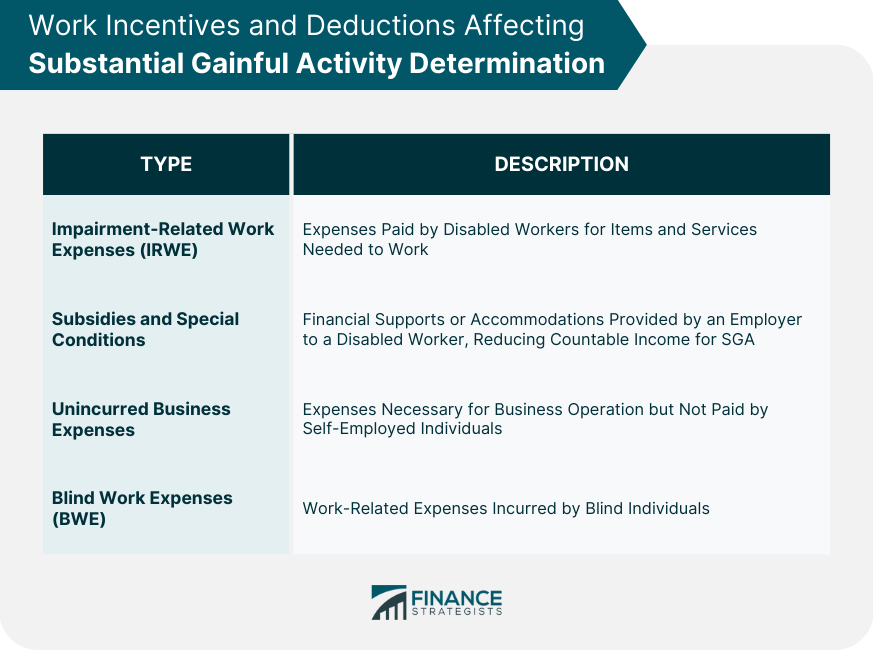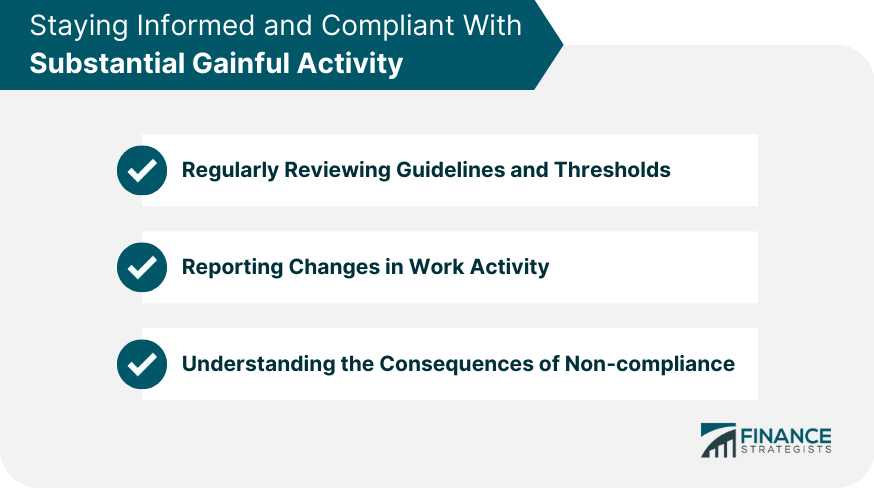Substantial Gainful Activity is a term used by the Social Security Administration (SSA) to describe a level of work activity that is substantial and gainful enough to disqualify an individual from receiving certain disability benefits. Under the Social Security Disability Insurance (SSDI) and Supplemental Security Income (SSI) programs, individuals must meet certain medical and non-medical criteria to qualify for benefits. One of the non-medical criteria is the ability to engage in SGA. One of the primary factors in determining SGA is the monthly earnings limit. This limit is adjusted annually for inflation and is set by the SSA. In 2024, the SGA limit for non-blind individuals was $1,550 per month, while for blind individuals, it was $2,590 per month. The SSA considers various work incentives and deductions when assessing an individual's SGA. These include: These are expenses paid by the disabled worker for items and services needed to work, such as assistive devices, transportation, or medications. These are financial supports or accommodations provided by an employer to a disabled worker, which can reduce countable income for SGA determination. These are expenses that a self-employed individual does not pay themselves but are necessary for the business operation. These are work-related expenses incurred by blind individuals, such as transportation, guide dog expenses, or adaptive equipment. For self-employed individuals, the SSA evaluates SGA using countable income and two additional tests: the comparability and worth of work tests. These tests assess the value and significance of the work performed by a disabled self-employed individual. SSDI is a federal insurance program that provides benefits to disabled workers who have paid into the Social Security system. SGA is a critical factor in determining eligibility for SSDI benefits. SSI is a means-tested program that provides financial assistance to disabled individuals with limited income and resources. While SGA is not a determining factor for initial SSI eligibility, it can affect ongoing benefits and payment amounts. SGA can affect disability benefits in several ways, including the trial work period (TWP), extended period of eligibility (EPE), and suspension or termination of benefits. Disabled workers can engage in a TWP to test their ability to work without jeopardizing their benefits. If their work activity exceeds SGA during or after the EPE, their benefits may be suspended or terminated. Special rules apply to students with disabilities, allowing them to work and earn more without affecting their SSI benefits. In some cases, the SSA may consider non-monetary factors, such as the value of work performed or the support provided by coworkers, when determining SGA. The Ticket to Work program offers disabled individuals access to employment services, vocational rehabilitation, and other support services to help them achieve financial independence. An individual may appeal an SGA determination if they believe the SSA has made an error or if they have additional evidence to support their claim. To appeal an SGA determination, individuals must follow the SSA's formal appeals process, which includes reconsideration, a hearing before an administrative law judge, a review by the Appeals Council, and, if necessary, a federal court review. During the appeals process, individuals can submit new evidence or information to support their claim. This may include documentation of work-related expenses, subsidies, or special conditions that were not considered in the initial determination. It is crucial for disabled workers to stay informed about the current SGA guidelines and thresholds, as these are subject to annual adjustments and may impact their benefits. Individuals receiving disability benefits must report any changes in their work activity to the SSA promptly. This includes changes in hours, earnings, or job duties. Failing to report changes in work activity or comply with SSA requirements can result in overpayment, suspension, or termination of benefits. It is essential to understand the consequences of non-compliance and take necessary steps to remain compliant. Substantial Gainful Activity plays a critical role in determining eligibility for disability benefits through programs such as Social Security Disability Insurance and Supplemental Security Income. Factors such as income thresholds, work incentives, deductions, and self-employment considerations are all taken into account when assessing an individual's SGA. Understanding the impact of SGA on eligibility and benefits, as well as the various exceptions and special cases, is crucial for individuals with disabilities navigating the complex disability benefits landscape. Staying informed about current SGA guidelines and thresholds, promptly reporting changes in work activity, and understanding the consequences of non-compliance can help ensure continued eligibility for benefits. Furthermore, the Social Security Administration offers resources and support, such as the Ticket to Work program, to help disabled individuals achieve financial independence and self-sufficiency. The appeals process for SGA determinations provides an opportunity for individuals to contest decisions they believe are incorrect or to submit additional evidence in support of their claim. By promoting self-sufficiency and independence, the SSA aims to improve the quality of life for people with disabilities, enabling them to contribute meaningfully to society and lead fulfilling lives.What Is Substantial Gainful Activity (SGA)?
Determining Substantial Gainful Activity
Income Threshold
Work Incentives and Deductions
Impairment-Related Work Expenses (IRWE)
Subsidies and Special Conditions
Unincurred Business Expenses
Blind Work Expenses (BWE)

Self-Employment and SGA
Social Security Disability Programs and SGA
Social Security Disability Insurance
Supplemental Security Income
Impact of SGA on Eligibility and Benefits
Exceptions and Special Cases
Students With Disabilities
Non-monetary SGA Considerations
SGA in the Context of the Ticket to Work Program
Appealing an SGA Determination
Reasons for Appeal
Process for Appealing an SGA Determination
Providing Additional Evidence
Staying Informed and Compliant With SGA
Regularly Reviewing Guidelines and Thresholds
Reporting Changes in Work Activity
Understanding the Consequences of Non-compliance

Final Thoughts
Substantial Gainful Activity (SGA) FAQs
Substantial Gainful Activity is a term used by the Social Security Administration (SSA) to refer to a level of work activity and earnings that is considered significant enough to demonstrate that an individual is not disabled and therefore not eligible for disability benefits.
As of 2024, the SGA level for non-blind individuals is $1,550 per month, while the SGA level for blind individuals is $2,590 per month. Earnings above these levels may be considered substantial and may result in the loss of disability benefits.
SGA is determined by the Social Security Administration based on the amount of income an individual earns from work activities. The SSA uses a formula to determine if an individual's income exceeds the SGA level and therefore indicates that the individual is not disabled.
Most forms of income earned through work activities count toward SGA, including wages, self-employment income, and bonuses. Other forms of income, such as investment income or rental income, generally do not count toward SGA.
Yes, an individual may still be eligible for Social Security disability benefits if they earn income below the SGA level, as long as their medical condition meets the SSA's definition of a disability. However, if their income exceeds the SGA level, they may no longer be eligible for disability benefits.
True Tamplin is a published author, public speaker, CEO of UpDigital, and founder of Finance Strategists.
True is a Certified Educator in Personal Finance (CEPF®), author of The Handy Financial Ratios Guide, a member of the Society for Advancing Business Editing and Writing, contributes to his financial education site, Finance Strategists, and has spoken to various financial communities such as the CFA Institute, as well as university students like his Alma mater, Biola University, where he received a bachelor of science in business and data analytics.
To learn more about True, visit his personal website or view his author profiles on Amazon, Nasdaq and Forbes.











